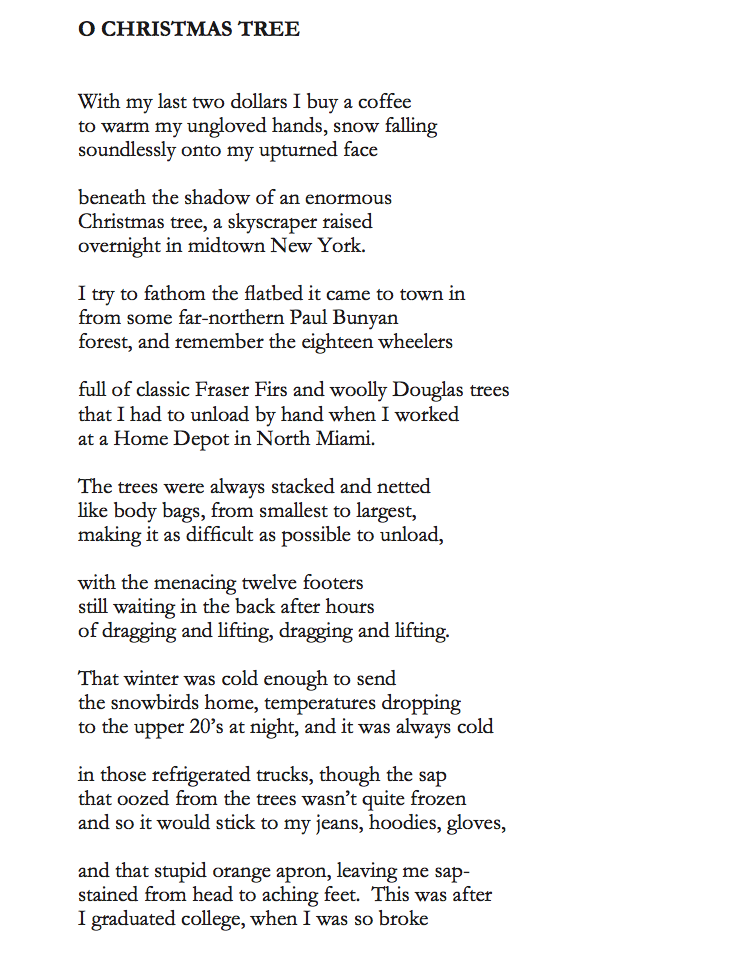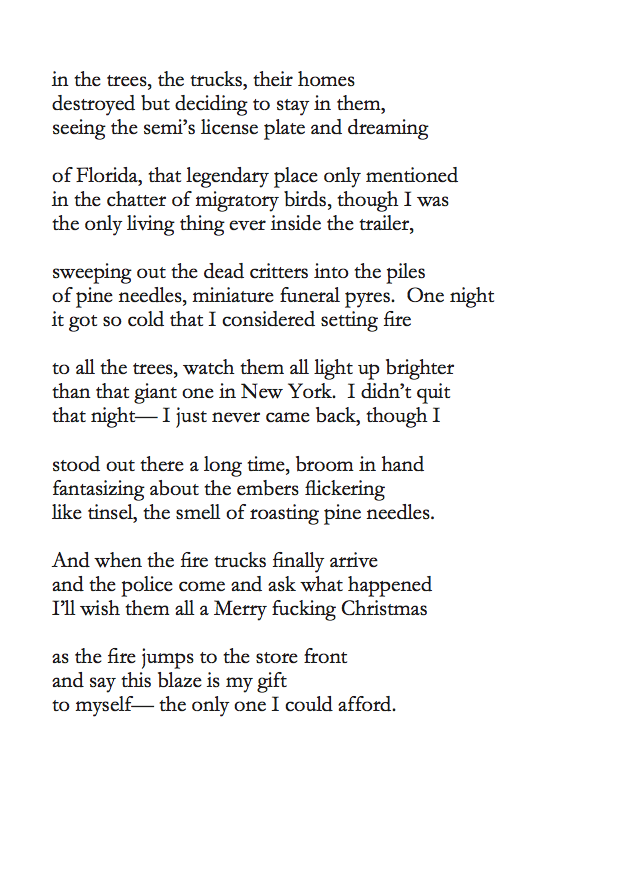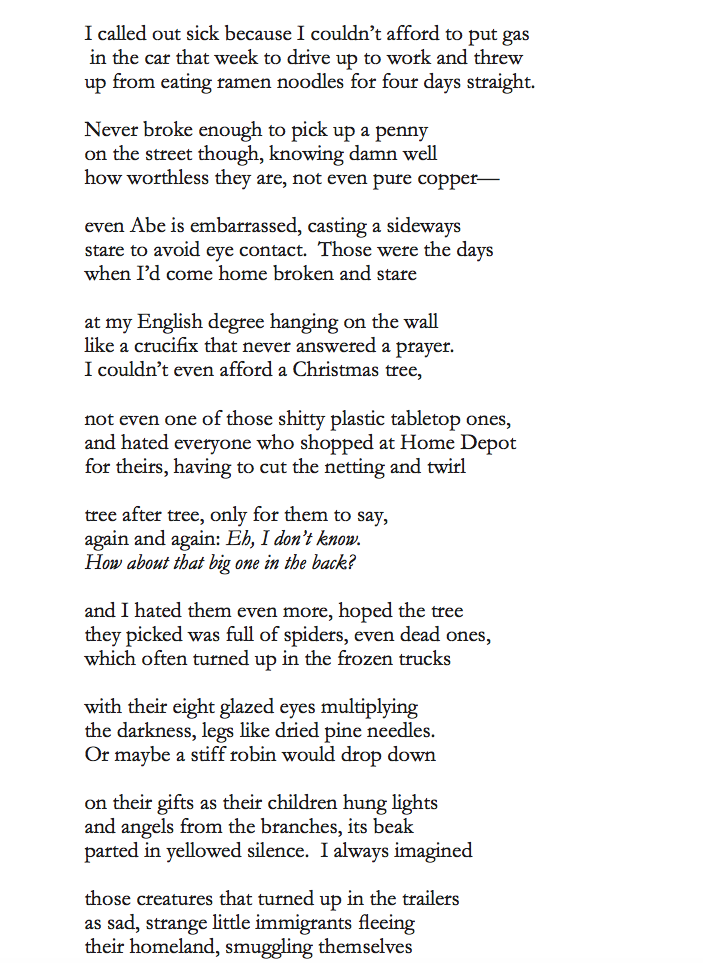5. “A Piece of Good Luck” focuses on a world where everyone lives in “Quads” based off of their socioeconomic class. You’d said that you might come back to it, you might not, even with one of your edited stories featured in the same world. Has that changed at all since we talked, or is it still ‘wait and see’?
To answer your question, I find that now, somehow, quite a few of my stories will be connected—or already are—in a pre and post Quad world. There may be three or four more Quad stories and I’ll end it. I’ve got other interesting worlds to explore. The Quads seem like a strange place, but it almost feels like home to me because it's a place I invented based on things I’ve seen. It’s not like cities went from thriving to becoming ghost towns overnight; it has been happening and we have been watching. Sometimes we choose not to see what’s happening because it’s so depressing, but that doesn’t make it disappear.
The idea of “The Quads” has been bouncing around in my head for years. I've finally put pen to paper and made it happen. I’m the chick with the overactive imagination breathing life into what a lot of people consider dead and abandoned. I want to show the reader where they come from, how it happened and what life is like during.
For me, it’s almost like The Quads are inventing themselves. Some of the dead or abandoned cities have some type of justice system happening among the people (dead bodies or body parts turning up in abandoned houses). In my opinion, there's only a matter of time before the poorer communities will start being fenced off from the not-so-poor communities “for their own benefit and safety.” When this happens, I'll just post a picture of myself on my blog with the words—"I warned y'all."
6. Getting into the story, it notes that “before the Quads, [Hugh and Floyd] lived near each other in the countryside.” It isn’t just a shift from old to new, free to enslaved, but also from open to close. That the world becomes to them (and feels to us) small, regimented, and novel seems reflective of the stratification we see today. I won’t press the analogy—new technology making the world feel smaller, capitalism consolidating wealth—but do you feel that this is a fair reading of the story?
But have you noticed how the more tech-savvy we are, the further we are from each other? Don’t talk to me, just text me, while we are sitting in the same room, across from each other. My daughter has an iPad. She will play on it all day if I let her and if her cousins come over; they sit and play next to each other (on their iPads) instead of directly speaking to each other. It’s a strange dynamic to me because we didn’t have technology like this when I was young. It was more of a “Take your sister and go outside. See you when the street lights are on.”
I mean, I’m still waiting for my flying jet car just like they had on The Jetsons.
Hugh and Floyd lived in a simpler time. I’m not saying general stores and cowboys, but smaller cities or communities like I grew up—everyone knew everyone. Having been bounced around the penal system, they (can choose to be or) are oblivious to the world changing around them.
In a sense, yes, the world does become smaller to them. The Quads don’t give them room to stretch, but they adapt to it because it’s necessary. In the same right, the world remains the same for them with crappy factory jobs, small apartments, black-and-white TV with antennas and cheap beer.
7. Typically writers focus on what one might call the domestic imagination—typically middle-class people living through typical day-to-day affairs in vigorous contemplation. What’s appealing about your story, however, is it focuses on working-class characters. You could call them 'criminal class,' even. Why write their stories? What do you think is missing about their perspective?
I write what I know. I have lived and worked around upper, lower and middle class people all my life. I’ve discovered the penchant in fiction for working class portrayal is usually a stereotype: somewhere there’s a trailer, someone has an alcohol or drug (more likely alcohol) problem and there will always be small children (in soiled diapers) running around. Conversely, in reading about working class blacks, there is always—always—a single mother raising a child (probably a boy) on her own. Her husband has left her and her son is always on the cusp of doing something wrong-joining a gang, talking back, etc. And one day, a white savior will appear and help her son get his life together. I read this and just throw the book across the room, running around my living room, yelling, “Really?! Seriously?!”
I write to disprove these stories. This isn’t how real people live. I’m not ashamed to say I’m working class. I get up, go to work and do my job. I come home and read with my daughter, fix dinner, watch TV—maybe get some editing or writing done—and go to bed. This is the perspective that is always missing from the story. All of our stories are important because one would be surprised at how much we all have in common as people and not stereotypes.
Additionally, not all criminals are bad. There are quite a few stupid ones out there—which I have proven in my story. When someone says criminal, there’s always a stereotype associated with it. I wanted to show these two guys, with bad luck, trying to catch a break. These guys wouldn’t beat you down in an alley for your wallet. They are too old and too tired. They messed up in the past and they just want to live their lives and adapt to their new surroundings.
8. Ultimately though, your story is about the ability to change one’s future. I saw this in one of the other stories you had us edit (“Tempus Edax Rerum”). Like we talked about in the original phone interview, you write about the irony of making change because it plays out in daily life all the time. Very O. Henry that way. But that begs the question, one I think that is implicitly asked in “A Piece of Good Luck”: How much can one change the direction of one’s life? Do you have any thoughts on this?
I love my city, Cleveland. Clevelanders almost have the same mantra, which is keep your head down and keep moving forward. It doesn’t matter how you feel, it’s the progression of moving forward and understanding that this time tomorrow, and things will be different that keeps you moving and makes everything okay.
I’m a person that believes what you put out in the universe, you will receive back. Put out negative energy and that’s what you get. So, yes, anyone can change the direction of their life if they choose to change it. Some people just go with the flow because it’s all they know and they think, “Well, if I change, it won’t be good.” If we look at Hugh and Floyd in the short story, one of them not only thinks outside the box, but also believes in what he’s doing so strongly that he doesn’t consider the consequences of his actions. He just knows he is right, despite warnings from everything around him.
As a writer, I am petrified to share my work, but this is only normal. Once I removedthe fear and said to myself, “This is not half bad and your friends and family wouldn’t lie to you, give it a chance and send it out.” It’s not everyone’s cup of tea, but someone will like it. And that’s what led me to Boston Accent Lit.
9. For our readers, what are you working on now?
Well, I feel like I am always editing. I am editing the three stories you guys reviewed—and I really appreciate it. Editing and entering contests or anthologies seem to be one route I’m taking with the shorter stories.
I am also self-editing a book about a man who spent a chunk of his life in juvie and a psychiatric ward before The Quads are in existence. Once he is released, The Quads are being formed and he has to rapidly assimilate into society. On top of all of this, he believes he is a superhero.
Once he starts seeing his “Wellness Coordinator,” he learns a dark secret about himself and why he believes he is a superhero. It doesn’t necessarily unravel from there, but it puts a lot of his life in perspective and helps him to get a better understanding of himself and his situation.
One of the underlying issues of this book is mental illness. I hope to take away the stigma people often associate with mentally-ill people. This book touches on using medication to help with mental illness, journaling, ECT (electroconvulsive therapy) and other methods of self-help for mentally-ill people. People fear what they don’t understand. If one person reads this book (I’ve titled it Monachopsis. It means the subtle but persistent feeling of being out of place) and either gets help or realizes they aren’t alone, then I’ll be a happy camper.
One additional thing I’ve done is added a playlist in the back of the book, so the reader can really get into the protagonist’s head. There’s a wide variety of music like Steely Dan, Public Enemy, and (of course) Prince, but it leans a bit heavy on some old school ska and rock steady—like The Specials and Alton Ellis.
10. Anyone you want to thank? Any social media you want to plug? Etc?
I would like thank my sister, Teri Cross Davis, for reading all my writing and not calling me up asking if I was okay because of the scary things I write. And I’d like to thank Jess Stork for diving into my world and sharing her world with me at the right time—right after the election. She always gives me the right amount of input and advice on my work. And we both are from Cleveland, so we have that connection as well.
If people are interested in what I’m reading-they can follow me on goodreads: https://www.gooodreads.com/ldglns.
If they want to experience the dry humor, I’m on twitter: https://twitter.com/1dangerouswoman
and for my random crushes or thoughts, they can find me on tumblr: http://blacklotus71.tumblr.com/
I would like to thank Justin and Rashi for their edits as well.














